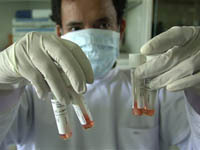WHO to publish secret research about H5N1 bird flu virus
Two studies showing how scientists mutated the H5N1 bird flu virus into a form that could cause a deadly human pandemic will be published only after experts fully assess the risks, the World Health Organization (WHO) said on Friday.

Speaking after a high-level meeting of flu experts and U.S. security officials in Geneva, a WHO official said an deal had been reached in principle to keep details of the controversial work secret until deeper risk analyses could be carried out, informs Reuters.
The World Health Organization is expected to announce later its view of how to circulate the research safely to scientists studying the H5N1 virus in humans. Dr Bruce Alberts, editor of Science, was asked by US security advisers not to publish parts of the work because of concerns it could help terrorists to develop a biological weapon. But he says it is important to get the research out quickly to scientists and health officials monitoring the virus.
Speaking at the American Association for the Advancement of Science meeting in Vancouver, he said: "Our position is that, in the absence of any mechanism to get the information to those scientists and health officials who need to know and need to protect their populations and to design new treatments and vaccines, our default position is that we have to publish in compete form.", according to BBC News.
There were calls for the research to be kept secret, but the WHO has decided it is in the public interest to release it. The disease remains a huge problem in countries from Indonesia to Egypt.
When the H5N1 strain of bird flu has been contracted by humans, more than 60 per cent have died, making it one of the most lethal strains of flu ever detected. James Cook University microbiologist Dr Graham Burgess says if the virus hit Australia, more than 1 million people would die, says ABC Online.
The researchers in the Netherlands and Wisconsin made genetic changes in the virus that made it transmissible through the air among ferrets, an animal considered a good model for the way flu behaves in humans. It is not known whether the new virus would be equally contagious in people.
Bruce Alberts, editor of the journal Science, said his journal and another one, Nature, had been planning to publish redacted versions of the research in mid-March. Now, Dr. Alberts said, they will wait until it is considered appropriate to publish the full versions. He said he was surprised that the group meeting in Geneva had reached a decision so promptly, reports New York Times.
Subscribe to Pravda.Ru Telegram channel, Facebook, RSS!




